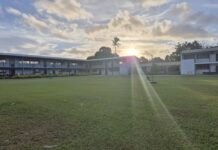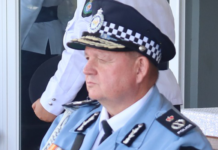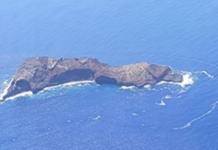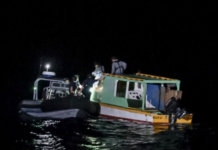During an engaging dialogue with Tongan students at the University of the South Pacific (USP) in Fiji this week, His Majesty King Tupou VI shared valuable life lessons, but it was his reference to a mysterious figure named Tavi that sparked the most curiosity.
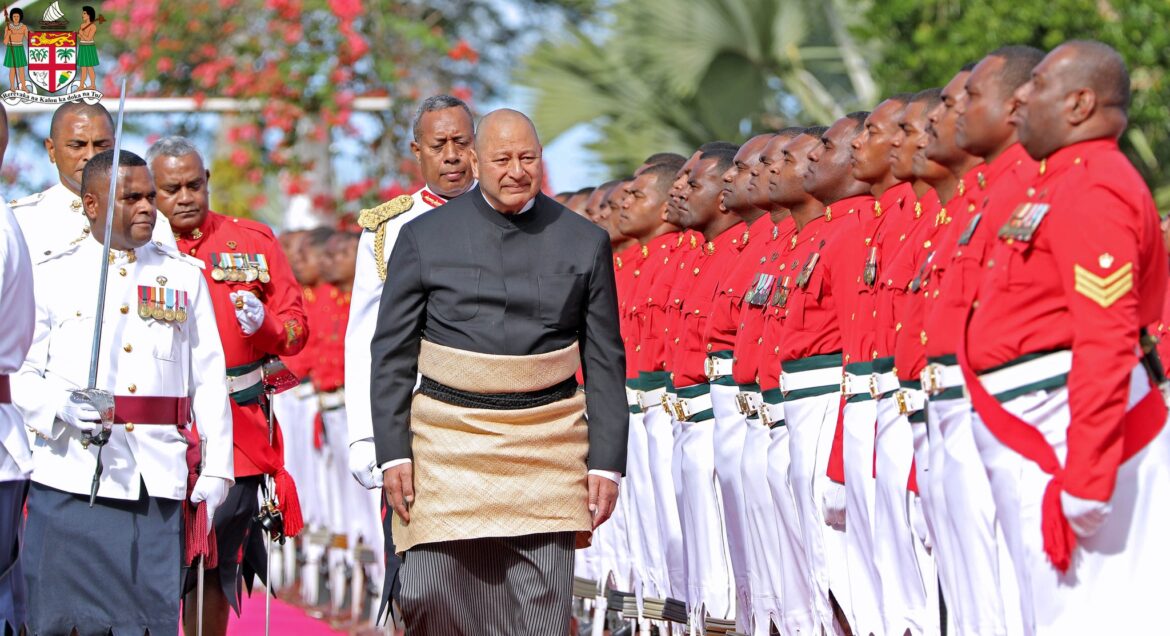
King Tupou VI and Queen Nanasipau’u were meeting the students after arriving in Fiji on Tuesday, where they received a formal traditional welcome at State House in Suva.
His Majesty was honoured with a 100-man guard of honour and conferred the title of Honorary Companion of the Order of Fiji.
Following the ceremony, the royal couple travelled to Lakeba in Lau to witness the historic installation of Ratu Tevita Lutunauga Kapaiwai Uluilakeba Mara as Turaga Tui Nayau, Sau ni Vanua ko Lau, and Tui Lau.
Their Majesties’ meeting with the students at ‘Api Tonga (also known as the Tongan Community Centre), on Laucala Bay Road in Suva, Fiji, directly opposite the University of the South Pacific (USP), has been described as “productive and unique.”
Royal Wisdom: Life’s Principles and Tonga’s Mysterious Danish Sage
In his opening remarks, His Majesty recounts points made by an Australian minister, Dr. Geoffrey Cummins, who studied King Tupou I, regarded as the “Builder of Modern Tonga.”
He highlighted the five important priorities attributed to King George Tupou I, comparing them to the five fingers of a hand.
He explained that the thumb represents religion, the foundation of life. The index finger stands for education, the path to progress. The middle finger symbolises development, the bond that unites society. The ring finger signifies traditions, the core of cultural identity. Finally, the little finger embodies freedom, the right to determine one’s future.
Before sharing this wisdom, however, the king paused and asked the students if any of them knew about a man named Tavi. None did. Intrigued, His Majesty then revealed the fascinating story of this enigmatic foreigner who became a legend in Tonga.
Tavi, as the king recounted, was a Scandinavian intellectual who arrived in Tonga in the 1950s. Born in Denmark, he grew up during the turmoil of Nazi occupation in World War II. After earning a degree in civil engineering, he first travelled to the United States, working as a civil engineer in San Francisco and helping construct one of the city’s major tunnels.
After saving enough money, he purchased a small sailboat and, along with a companion, sailed across the Pacific to Tahiti. From there, he continued alone to Tonga—a daring feat at the time, especially without modern navigation aids.
As documented by Thomas A. Riddle, a Peace Corps Volunteer who arrived in Tonga in 1974, he formed a friendship with Tavi, a Dane who had become disillusioned with Western society. By the age of 30, Tavi was even considering suicide if he could not find a more meaningful existence. His search for purpose ultimately led him to Tonga, attracted by its independent monarchy and resistance to foreign domination.
Upon his arrival, Tavi’s remarkable voyage caught the attention of the royal family. He soon met the late Queen Sālote Tupou III and the future King Tāufa‘āhau Tupou IV – King Tupou VI’s father.
Myth and Legacy: The Dual Life of Tavi
Adopted into Tongan nobility, he became a trusted advisor, contributing his engineering skills and his keen intellect to important projects, including the Free Wesleyan Church in Ha‘ateiho for then Noble Havea Tu’i Ha’ateiho. The church is known for its distinctive design, which is considered an iconic local attraction. Tavi also engineered a sawmill in ‘Eua. He also played a role in the construction of a building for Princess Pilolevu at Tufumāhina, where Tavi once lived.
Tavi also lived on Hunga Tonga island after being settled there by Noble Havea Tu’i Ha’ateiho. He also spent much of his time in Niuatoputapu and Tafahi.
Tavi’s lifestyle was known to be extraordinarily simple, almost ascetic, of Biblical proportions, akin to a modern-day John the Baptist. He slept naked on a rock and ate nothing but papaya (called “papaw” in Australia). According to Thomas, a neighbour once remarked that the three smartest men in Tonga were King Tupou IV (the first Tongan to earn a university degree), Professor Futa Helu (founder of the country’s only university), and Tavi himself.
Yet beyond his professional contributions, Tavi was known for his almost mythical reputation. One famous tale recounts how, while travelling by boat to New Zealand, the vessel became lost at sea.
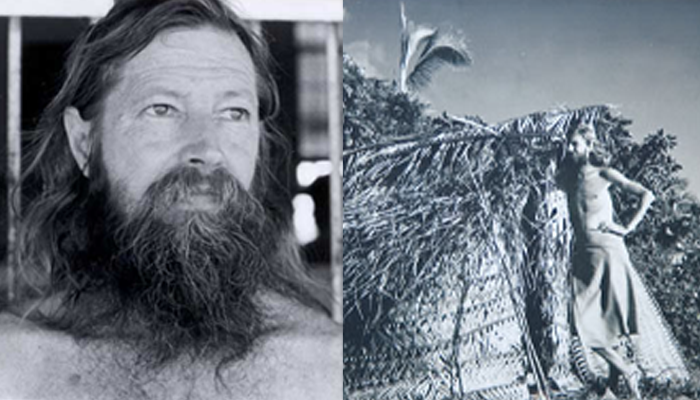
The desperate captain turned to Tavi for help. After lying quietly on the deck in deep thought, Tavi suddenly stood up, pointed in a specific direction, and the ship soon reached its destination.
In his later years, Tavi chose a life of solitude, retreating to the remote island of Tafahi. But his legacy lived on as a symbol of wisdom, resilience, and cultural exchange.
According to Thomas, the last place Tavi lived in Tonga was in the palace on ‘Eua before the two parted ways, never to meet again.
Thomas reported that Tavi returned to Denmark in 1991 or 1992 and died on April 11, 1995. Officially, his death was attributed to a heart attack. Unofficially, however, it is said that when doctors informed him his legs would need to be amputated, he chose to end his life by overdosing on medication. In other words—true to his nature—he found his own symbolic cliff’s edge, much like the one he and Thomas had once marked on ‘Eua. Rather than endure a diminished existence, he used his intellect one final time to leap into eternity.
Peace be with you, Tavi.
The King’s Message
King Tupou VI’s decision to mention Tavi in his address last week remains open to interpretation.
Perhaps it was a reminder of the value of education and tradition, themes central to both Tavi’s life and the king’s advice. Or maybe it was a nod to the unexpected ways in which outsiders have shaped Tonga’s history.
For the students present, the story served as a powerful lesson: sometimes, the most profound wisdom comes from the unlikeliest of sources. And now, when asked, “Who is Tavi?”—they will know.

